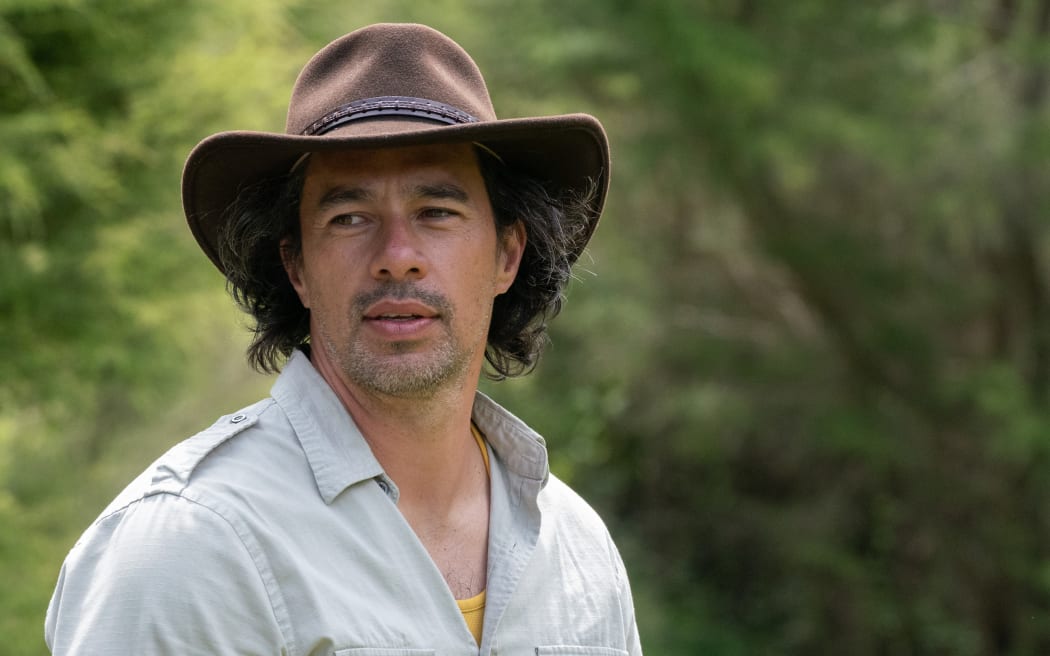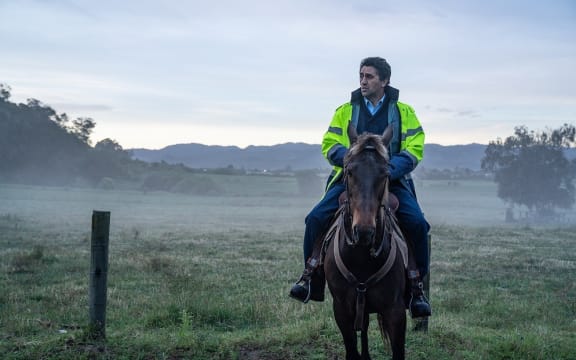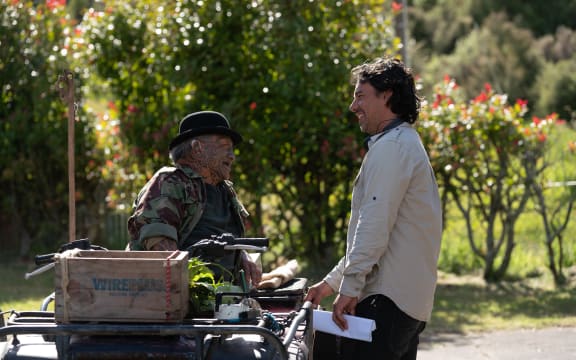
Director Tearepa Kahi on set of feature film Muru. Photo: Jawbone Pictures
By Aroha Awarau
The director of Muru, the highest-grossing New Zealand film of 2022, says it has helped normalise and showcase the unique te reo Māori dialect spoken by the people of Tūhoe.
Four generations of reo Tūhoe speakers appear in Muru, which was inspired by the controversial police raids on the small community of Rūātoki in 2007. Using new anti-terrorism powers, police responded to suspicions of a domestic terrorist camp operating in the Te Urewera forest.
Writer and director Tearepa Kahi (Ngāti Paoa, Waikato-Tainui) says his goal with the film was to both tell the story of the raids and highlight the unique te reo Māori dialect spoken by the people of Tūhoe.
"In Muru, we had four generations of reo Tūhoe speakers on screen, where kaumatua interact with their mokopuna and everyone in between."
Muru stars Cliff Curtis as a community police sergeant forced to choose between his badge or his people. It grossed more than $1.5 million at the domestic box office and was sold all around the world, including a lucrative deal with US streaming giant Tubi.

Cliff Curtis plays Sergeant 'Taffy' Tāwharau in Muru. Photo: Screenshot
As a result of the raids, 17 people were arrested and four later convicted on firearms changes. The police were forced to apologise after the Independent Police Conduct Authority found the searches in Tūhoe were unlawful, unjustified, and unreasonable.
"I wanted the allegorical power of Muru to be a conversation starter, allowing the central issue to return to the main stage, which is easily bypassed or forgotten. Muru was a cultural and artistic attempt to protect our communities from ever facing that level of action or treatment again."
Kahi, his wife Reikura who produced Muru, and activist Tame Iti, who portrays himself in the film and was a target during the raids, made a commitment to each other to bring the Tūhoe dialect to the forefront. The Tūhoe dialect's significant difference to other dialects is dropping the 'g' in the word 'ng' when writing and speaking Māori.
"After our first screening of Muru with Tūhoe kaumatua, the first responses were positive. They were telling us that for the first time watching a Māori film they actually understood every kupu spoken by every actor on screen," Kahi says.

Tuhoe activist Tame Iti and director Tearepa Kahi on set of feature film Muru. Photo: Supplied
As more people are learning te reo Māori, some language experts fear that the language will become homogenised and the distinctive dialect from different iwi around Aotearoa could be lost.
Kahi is keeping the conversation alive with his follow-up to Muru. He and Reikura collaborated with Iti and Ruātoki-based artist and poet Ati Teepa to create a four-part companion documentary, Into the Valley. The series is currently streaming on ThreeNow.
"Into The Valley was like re-shooting Muru, but without any actors," Kahi says.
He sat down with those impacted by the 2007 raids, including police officers, AOS officers and the children who bore witness to seeing their school bus boarded, their homes raided and their parents arrested.
"Muru was a response to two raids against Tūhoe, a century apart. Into The Valley is a factual and personal response to Muru, that centres around healing," he says.
"It invites the nation to understand the impact of that day from across both sides of the line and to experience what healing truly looks like, what overcoming trauma feels like. Children, 15 years on, have lived with the effects of that day, and seeing their strength will give us strength."
Kahi, whose previous films include Poi E: The Story of Our Song and Mt Zion, is a proud father of four first-language reo Māori-speaking tamariki. He says all his work is focused on normalising te reo Māori, a key element seeded by his mentors and heroes, like fellow filmmaker Merata Mita and Iti.
"The degree of love that we have for te reo Māori is evident in all the work, my wife and our whānau create."

